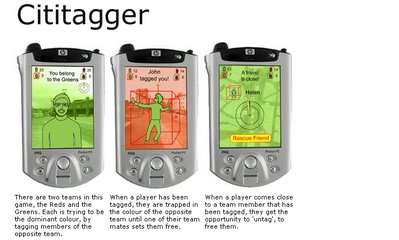CCS - Locative Media


Locative Media
Locative media is all derived from an American department of defense initiative, the Global Positioning System whereby you can use any three of the 24 GPS satellites orbiting the Earth to ‘triangulate’ your position based on your distance from each one, your position on the globe can then be placed to within 5 or 7 meters. The GPS devices necessary to locate you in this way are now little bigger than mobile phones. The technology we use everyday will shortly become ‘location aware’ and the potential implications to our understanding of the space around us will be profound. If your PC became location aware it might begin showing you banner ads for local shops and services. You may be able to receive updates to your phone or PDA giving you a realistic time of arrival for the location aware bus you’re waiting for. These developments will surely seem commonplace within years but at the cutting edge of digital expansion scientists, artists and communities of dedicated individuals are envisioning and exploring uses of this technology that will create a whole new level of reality for many of us.
GPS advancements along with the real possibility of ubiquitous wireless networks in our cities has paved the way for a second layer of reality, an invisible virtual reality to be overlaid on top of our physical world. In one sense another layer of reality exists anyhow, every place has a history and specific memories for all those who spent time there. A park bench might just be a point on a map, a construction of wood and metal but for some it will be a place where the met or split up with a lover, where they once made a life-changing decision or played when they were children. Now in the virtual world, people can attach information to a specific place that others can see and experience for themselves. People will be able to ‘read’ places and access layers of meaning that would never have been available to them before, humanizing seemingly impersonal and empty spaces. With this technology I could create a unique experience of a favourite space or journey of mine that others could share as they passed through where appropriate music would be triggered and images, feelings and memories I had of that place could be viewed. Layers of meaning could be embedded anywhere and everywhere.
The advent of ‘augmented reality’ where virtual objects can be placed in real space and viewed through special glasses or the screen of a laptop or PDA will further blur the line between the physical world and the world of information that increasingly surrounds us. Animated 3D characters could play with children in school playgrounds and the creatively minded could redecorate our cities with virtual graffiti, another vision of reality, open to all.
Already traditional past-times are being blended with locative media technology to create truly new game playing experiences. The city is turned into a playground by the creators of Cititag (http://cnm.open.ac.uk/projects/cititag/), as players dash around with pocket PCs tagging others or for the unlucky tagged player, rushing to find friends who can un-tag them and get them back in the game. Other players are visible on the map as are graphics displaying your current status. I was very interested in this as it is in essence a computer game but demonstrates how games of the future will break out of the home and into the outside world. The games can be played anywhere and we will need more than just our thumbs to play them.
Another use of locative media technology that impressed me was the Bristol based Futurelab’s learning project for 10-11 year olds, ‘Savannah’ (http://www.futurelab.org.uk/showcase/savannah/index.htm#projectarticle) where children learned about the world of Lions on the African plains by role playing as lions on a virtual environment laid on top of their own playing fields. With their PDAs displaying the virtual grassland the children have to make decisions and move around their territory as a lion would while chasing prey, finding watering holes and so on. This kind of experiential learning is not only very enjoyable for the kids but allows them a deeper level of understanding that books or the internet alone could not.
URLs of Interest
http://www.netzwissenschaft.de/mob.htm#mixed
A list of many of the cutting edge technologists, collectives and their locative media projects.
http://www.c5corp.com/projects/gpsmediaplayer/index.shtml
A GPS media player showing images and descriptions of hiking paths alongside a map which displays the hiker’s progress.
http://netpublics.annenberg.edu/locative_media/beyond_locative_media
A fascinating article on the social implications and future of fully networked public spaces.

0 Comments:
Post a Comment
<< Home